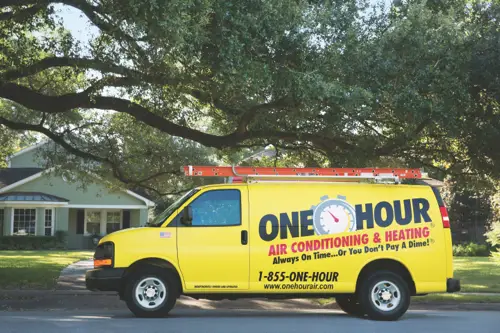 Your home’s air conditioner is a complex system with all kinds of electrical, mechanical, and electronic parts. Somewhere in the middle of all those important components is the capacitor, a simple device that can leave you high and dry – and hot – if it fails. The entire system will fail to cool if the capacitor goes out, leaving warm air blowing through your ducts and creating strain on an air handler that can’t cool the house.
Your home’s air conditioner is a complex system with all kinds of electrical, mechanical, and electronic parts. Somewhere in the middle of all those important components is the capacitor, a simple device that can leave you high and dry – and hot – if it fails. The entire system will fail to cool if the capacitor goes out, leaving warm air blowing through your ducts and creating strain on an air handler that can’t cool the house.
If your system is running constantly without providing any cool air, a capacitor is a good suspect. Here is a little more about these important parts and how to know when that might be what’s wrong.
What Is a Capacitor?
Capacitors are found in lots of applications besides just air conditioners. Their job is pretty simple. When your thermostat detects that the house needs cool air, it sends a signal to the outdoor unit and the air handler telling them to activate. The outdoor unit includes a compressor and a large fan, both of which require a lot of power to start. Their electrical needs drop off significantly once they get going, so the capacitor’s job is to provide the extra power needed to start them. The capacitor is a lot like the person who would spin the propeller on an old airplane to start it.
The capacitor itself is actually a fairly small device, sometimes smaller than a soda can. It stores up some electricity during normal operation, then discharges it to kick-start the fan and compressor when the system comes on.
How Do I Know When It Fails?
The most common sign of a bad capacitor is a system that blows hot air. That’s a clear indication that every part of the indoor system is doing its job, but that it lacks the refrigerated air needed to blow cold air.
Capacitors handle lots of electricity and are surrounded near lots of other powerful electrical devices, so it’s not safe for a homeowner to attempt to locate the capacitor. Any attempt to do so is dangerous and will also void your warranty. With that said, there are a couple things you can safely check to see if your capacitor may be the issue.
When you discover that the system is blowing warm air, go to your outside unit. Its fan should be running, and you may even see some condensation dribbling out from under it. If the fan is not spinning, or if you hear a humming sound like something is trying to start, there’s a good chance that your capacitor is bad. There may also be a burning odor present. If you detect any of these signs, contact One Hour to see about further diagnostics.
What Causes Failed Capacitors?
The capacitor has an uphill climb in terms of its load. The compressor and fan require a big push to get going, so if the system is cycling frequently on a hot day, the capacitor may simply not be able to keep up with the constant demands.
Some systems blow capacitors more frequently because of erratic voltage through the power lines to the home, often the case on a dead-end line. The capacitor could also be damaged by power surges from lightning, irregular voltage during an outage, or with a backup generator.
How Long Will Repairs Take?
The great news is that a capacitor replacement is a pretty simple job for a qualified technician. Most of the time, your contractor will have the right size in stock, meaning you won’t have to wait for one to be shipped in. Make sure that you get the brand and model number of your unit when you call for service so that the technician can look up the exact capacitor you’ll need and be sure to bring one.
The technician will do a couple of quick tests to confirm that the capacitor is the problem. After that, he or she will only have to shut down power to the outdoor unit, not to the rest of the house. After that, the job will go pretty quickly, and you’ll once again feel the wonderful sensation of cold air blowing through your home.
An added bonus is that the technician may be able to make an upgrade on your capacitor. Some systems have two separate ones, a start capacitor and a run capacitor. In some cases, the technician can combine those into a single function that will make things easier in the future. Your technician also may notice other emerging problems during the visit and make recommendations for repairs that could reduce the cost and the headache of a future breakdown.
A capacitor replacement is a fairly inexpensive AC fix that will quickly restore cool, comfortable air to your home.